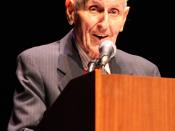Euthanasia
By: Susan Humphrey
Your voice is hoarse. Your chest is burning. Your every wheezing breath is a struggle. You have been diagnosed with lung cancer and your condition is worsening. You are no longer able to rise from your hospital bed and you begin to contemplate death. Surely life shouldn't be as painful and agonizing as this? Shouldn't death be a time of peace and fulfillment? After many hard days, you have come to a decision. You ask your doctor to administer a lethal injection so that you may die peacefully and end your suffering. As a physician, he cannot stop you from dying, but can he, in all good conscience, assist you?
In the face of painful and crippling diseases such as cancer, Alzheimer's, Lou Gerihg's Disease, and AIDS, a debate is rising about a patient's right to control death. A growing number of people are considering the controversial act of euthanasia, demanding the right to end their lives on their terms.
Many people dread the prospect of spending their last days in a hospital, dependent on machines and drugs, or in a nursing home, needing to be washed, dressed and fed. For those who fear this life of dependencies, euthanasia presents a solution. However, euthanasia has medical, legal, religious and ethical concerns. It may lead to the abuse, exploitation and erosion of care for the most vulnerable among us.
Euthanasia, also known as assisted suicide, is a Greek word meaning a good or easy death. The two types of euthanasia that are debated in our society today are passive and active euthanasia. Passive euthanasia is the act of discontinuing treatment that could potentially prolong life, while active euthanasia is the work of actively interceding to cause death, as by administering a lethal injection. Euthanasia is not murder,



WOW
This is an amazing essay, beautifully structured perfect to help me for my assignment
0 out of 0 people found this comment useful.